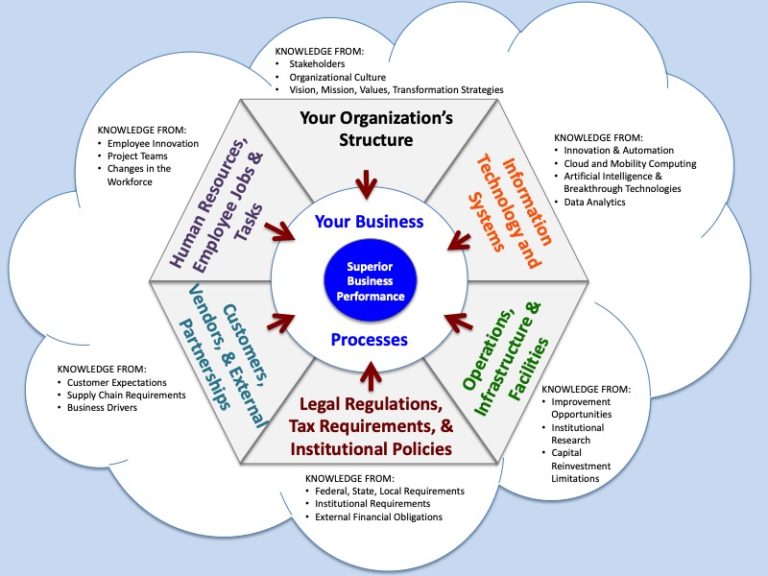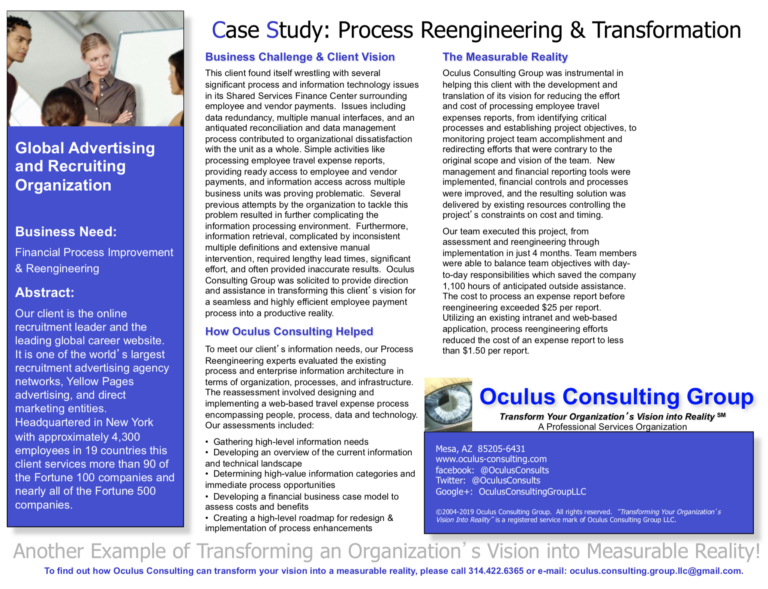Is Your Process Management Framework Effective?
Whether your organization is revisiting generic solution implementations, or you’re exploring one of today’s innovative technologies, the key to creating and ensuring the appropriate process management framework will be essential for an effective process improvement and technology implementation.

By Oculus Consulting Group LLC
During periods of your organization’s performance success, it is not uncommon to find your organizational leadership contemplating process improvements intended to leverage those successes throughout the remainder of the organization. The challenge within any business unit that wants to improve its performance is the necessity to come up with a process management approach in which everyone within the organization has confidence, and ultimately buy-in. Personal process preferences between various functional units and the organization’s personnel will always compete against the consistency of techniques demanded throughout the entire organization. For that reason, organizations often employ a variety of methods in working toward process management, usually derived from a multitude of sources, and each method often has some level of merit within the organization.
Arguments over exactly which process management approach to use often reflect ongoing power struggles between various business units or employees within the organization, rather than the genuine methodological debates as to which approach will produce a replication of the business success. In many cases, change agents may make up their own methods based on what they hope will work, or methods that will protect their individual processes, power, or authority. These methods often reflect a bias from a particular professional viewpoint. The result is a process management framework that is as diverse and fragmented as your organization it’s self. Having a consistent and repeatable process management framework can mean the difference between failure and success when business process replication is required.
“Many within the organization’s leadership often fear that developing and implementing a formalized method will take too much time from too many people, and will ultimately take too long to get a desired result.”
For example, process management methodologies derived from the information technology units within an organization usually focus on business processes as a way to fulfill system requirements. These methods often shortchange the other aspects of transformation, such as incorporating the organization’s vision, culture, and management structures. On the other hand, process management framework approaches from the human resource professionals are great a dealing with employee roles, job and position tasks, and required knowledge competencies; but usually fall short when it comes to incorporating facilities and technologies. HR staffers are often caught up in an ‘organizational structure’ type of thinking rather than in uniting much needed cross-functional perspectives. Your organization’s process management framework must attempt to provide guidance that can be used organization-wide because it takes an enterprise view, rather than a functional unit or individual process perspective. It should be designed to accommodate a wide range of professional requirements and to align them with one another.
Another challenge in coming up with an accepted, reusable approach to process management across the organization is the belief that anything too formal will take too long to document/define/refine/implement, especially if there is perceived pressure to change. Many within the organization’s leadership often fear that developing and implementing a formalized method will take too much time from too many people, and will ultimately take too long to get the desired result. As a result, the “just-do-it” advocates within your organization can rule the day and will miss the point that doing the wrong things fast is never a good business option. Their desire to reach a quick conclusion actually provides a strong case for a consistent framework’s reuse and the necessary planning that associates the scarcest human and financial resources only with the most important things for the business. At Oculus Consulting Group, we have found that using the formalized methods of our Process Management Framework doesn’t waste organizational resources in false starts and rework, and the framework avoids delivering poor results to people and organizations undertaking desired process improvements.






The approach that we take to your organization’s Process Management Framework is to produce a set of guidelines based on best practices that help guide you in your march to business process change and management. You won’t find any component of the framework that is considered revolutionary; it’s just good business sense. Our value comes from logically putting together process management concepts so that the process maintains alignment and traceability to your business objectives. At Oculus Consulting Group LLC, we understand the complexities of successfully managing the business process improvement approach and also the necessity to comprehend the implications of the technologies in far-reaching ways for your enterprise.
Our Process Management Framework is designed to be performance-driven. It can be implemented comprehensively or partially, depending on how complex your initiative is. Our approach can scale up and down to initiatives and organizations of all sizes if used within a common framework. It has several entry points. You don’t have to start from the beginning and go all the way through to the end, although you would probably benefit if you did. The framework’s components and techniques can be modified to accommodate approaches that have proven to work in some of the world’s largest and best organizations. Your process management framework deserves to be a guideline, not a cookbook to be followed without question.
If it is time to re-evaluate your organization’s process management framework for business process improvement, you may want to assess whether or not your process management framework addresses these two key objectives.
Does Your Framework Focus on Process as a Discovery and Learning Activity?
Each phase of your process management framework should focus on enabling more effective and efficient processes that will deliver improved performance from your organization’s customers and stakeholders. Your process emphasis may vary from phase to phase and should depend on your specific project’s nature. Each process within your framework review should evolve the understanding of the current state and add specifics to the design for what is to come. In your process management journey, you must know where you are currently and decide where you want to go in the future; otherwise, all of the maps and models in the world that your organization develops won’t help you. Addressing both a current and future perspective through your framework process will help you maintain your improved performance course and allow for new insights to be gained, new learning to occur, and needed corrections to be made. Your approach should be an iterative one that attempts to avoid paralysis through too much analysis. It should strive to exploit both operations of the human side of the business; incorporate the advantages of your technology infrastructure and systems; along with the empowerment of the analytical and conceptual thinking team members of your organization. It should be designed to gain buy-in and eliminate objections as the management of these activities proceeds. Building commitment to the solution should constantly be addressed through successively focusing on the logical results. At Oculus Consulting Group LLC, our demonstrated competence and expertise in organizing and managing the framework of critical process management projects like this has been well documented.
Does Your Framework Focus on Architecting Processes and Aligning Business Strategies?
Your framework must identify the relationship between business processes, technologies, facilities, human resources, customers and suppliers, and your business strategy. From each of these business stakeholder groups, you must identify the events and outcomes and, then the critical activities required for the process improvement architecture. From these criteria within your approach, principles, expectations, key performance indicator targets, and critical success factors for each business unit, you can then prioritize which processes should be dealt with first.
The most appropriate strategy for your organizational process alignment must be determined to make the process, knowledge, and technology solutions for your organization the most viable. Incorporation of operations and external requirements should be addressed, and within the appropriate framework, the requirements of human resources should be examined, and their fit with current capacities as well as skills and competency requirements must be investigated. Your framework must allow for iterations until all the process components fall into sync with one another, and a set of technological architectures with integrity can be produced. Only then will these architectures guide your organization in producing and managing a program of change that rolls out the benefits envisioned and expected by your organization’s key stakeholders.
For example, one of the largest community college districts in the country recently implemented a “vanilla-attribute” enhancement to their new HR system across their 10 community colleges. The goal was to take the HR system back to a more “vanilla” configuration anticipating the realization of best practice processes inherent in the initial system and incorporating new technologies now available. Not an uncommon goal in many organizations. Failing to understand the necessity of process management in the solution design, the go-live implementation quickly deteriorated into the death of the implementation. Faculty went multiple semesters without pay, a “no-confidence” vote against the Vice-Chancellor of Human Resources was proposed and passed, and departments began to work furiously to find workarounds for their employee pay process problems. Some employees waited 2 years for payroll corrections at the same time that the organization’s leadership admitted that Payroll personnel were “overwhelmed” by the resulting business process requirements. Human Resource Department employees who should have been the knowledge experts with the processes and system found themselves relying on various department secretaries for troubleshooting advice and worse, problem resolution. What started out as an ambitious change to move to a more vanilla software solution with fewer required modifications and simpler business processes, during implementation and eventual go-live became a dramatic example of wasted effort, time, and money.
Whether your organization is revisiting generic solution implementations like this higher education district, or you’re exploring one of today’s innovative technologies, the key to creating and ensuring the appropriate process management framework will be essential for an effective process improvement and technology implementation.
Concluding Thoughts
Regardless of the technology enhancements that your organization may be considering, the opportunity to refine and re-engineer your business processes, or revisiting your need for an improved process management framework, understanding how the entire organization will be impacted by these process changes is essential. For both processes and information, it is crucial to design the management environment that you want, rather than simply stumble into something because the enterprise-wide implications were not considered. Achieving a good fit between these process improvements across the organization means making explicit choices about the process management framework of your business. If you fail to explicitly consider process and information issues as you plan and implement any process revisions, it’s very unlikely that you’ll get the process and information environments that you want.
At Oculus Consulting Group LLC, we understand how a proper enterprise-wide orientation can mean the difference between successful responses to innovative business processes, dynamic technology application changes, responding to disruptive innovation, and the need for substantial organization transformation. Our demonstrated achievements in assisting our clients to transform their vision for positive process management effectiveness into a measurable reality of enhanced organization performance can assist your organization as you proceed with similar efforts.
To learn how you can secure our services and assistance, please contact us.
